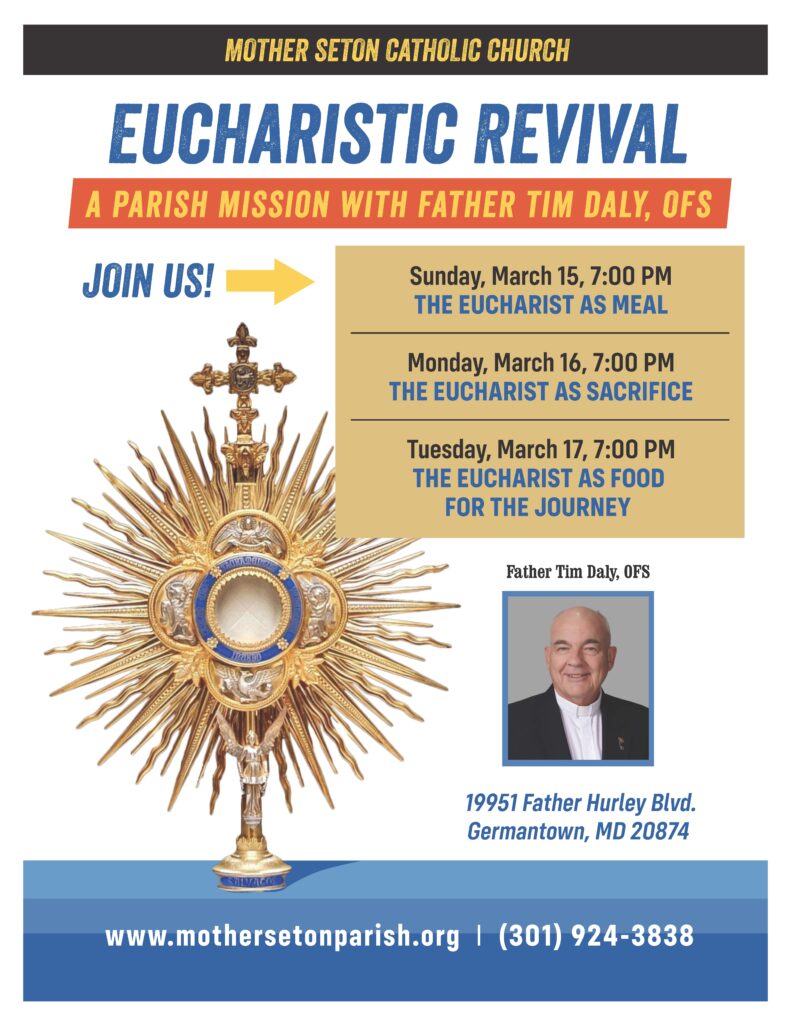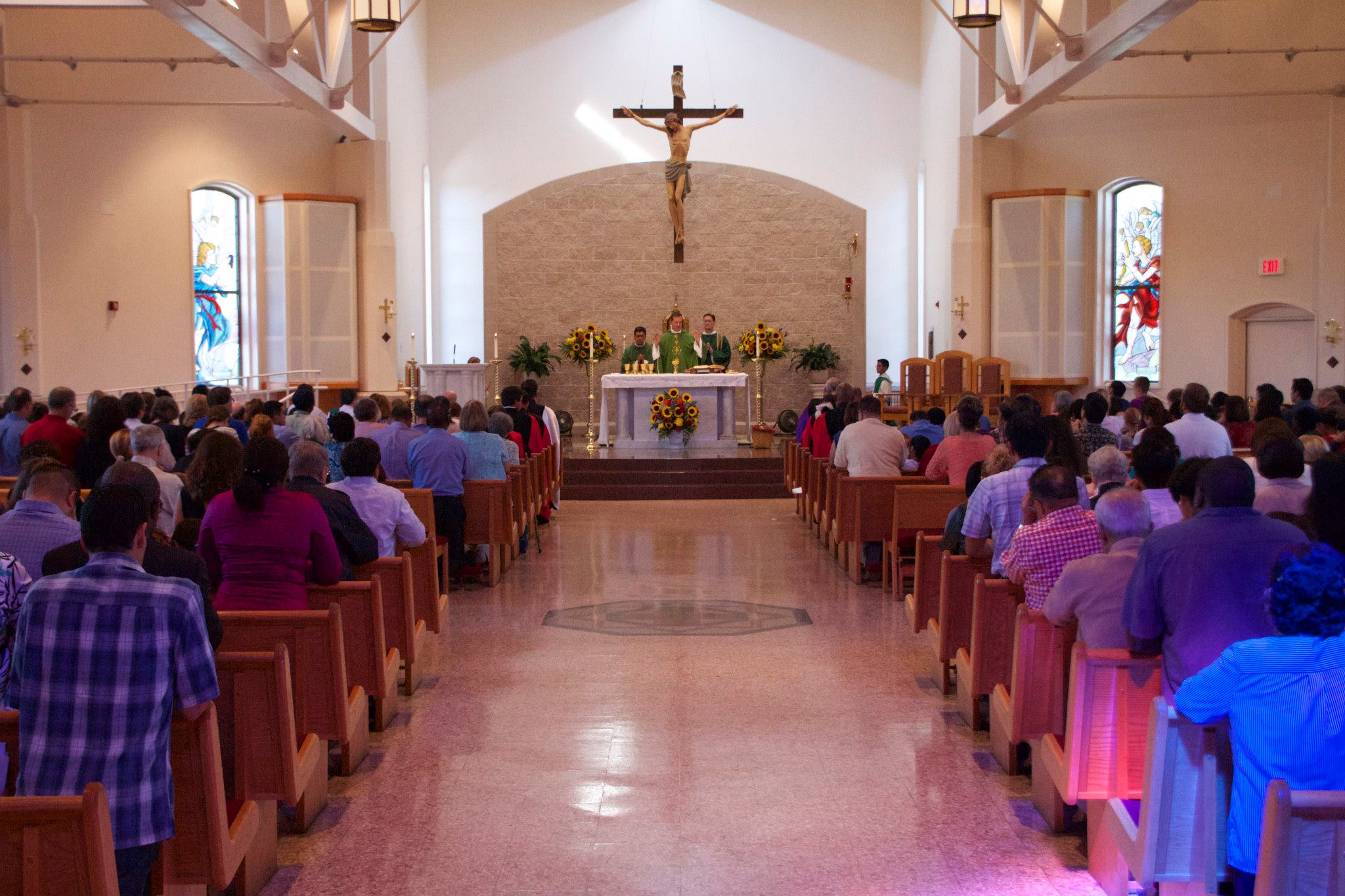These Forty Days of Lent
Dear Mother Seton Parishioners,
There are many ways of measuring time. Recently, I visited an exhibit that reflected on time philosophically, theologically, and even cosmically. This past week, much of the Eastern world celebrated the Lunar New Year, marking time by the phases of the moon. On our own calendar, we mark each date by the number of years since the Incarnation of Christ.
Yet among all these measures, there is one number that has always struck me as especially meaningful in our faith: forty.
Throughout Sacred Scripture, forty days, forty nights, and forty years appear again and again. Unlike hours measured by the sun or months marked by the moon, this number seems to arise from the human condition itself. The average gestation of a child in the womb is forty weeks. In that hidden, sacred time, life matures and prepares to be born.
Perhaps this is why Scripture uses “forty” as a sign of spiritual maturation.
• For forty days and forty nights, rain fell in the time of Noah, as the waters both cleansed the earth and bore the ark to safety.
• Moses spent forty days on Mount Sinai in the presence of God before receiving the Law.
• Israel wandered forty years in the desert, a long pilgrimage of purification before entering the Promised Land.
• The prophet Elijah journeyed forty days to Mount Horeb to encounter the Lord in the still, small voice.
• The people of Nineveh were given forty days to repent.
• After His Resurrection, Jesus remained with His disciples for forty days before ascending to the Father.
And, of course, before beginning His public ministry, as we will see this Sunday for our readings, Jesus fasted for forty days and forty nights in the desert. In doing so, He united Himself to our weakness, our testing, and our need for grace.
Water and forty are deeply connected: the flood, the Red Sea, the Jordan River, and ultimately the waters of Baptism. Just as the breaking of waters brings forth new life in birth, the waters of Baptism bring forth new life in Christ. The number forty reminds us that new life requires preparation, purification, and patient trust.
Now we begin our own forty days.
Lent is not merely a countdown to Easter. It is a time of gestation — a sacred season in which something within us is meant to grow. Through prayer, fasting, and almsgiving, the Lord matures our hearts. He stretches our faith. He purifies our love. He prepares us to share more fully in the new life of the Risen Christ.
As we enter this holy season together, may we embrace these forty days not as an obligation, but as a gift — a divinely appointed time for growth, renewal, and rebirth.
Be assured of my prayers for you and your families. Let us walk these forty days together, trusting that God is bringing new life to birth within us.
In Christ,
In Christ,
Rev. Kevin Regan

Father Timothy Daly will preach at all English Masses on the Fourth Sunday of Lent – March 15, 2026
Schedule for Sunday, Monday, and Tuesday
6:00 pm – Exposition of the Blessed Sacrament
6:00 pm until 7:00 pm – Confessions
6:55 pm – Simple Reposition
7:00 pm – Talk by Fr. Tim Daly
7:45 pm – Exposition followed by Benediction
8:00 pm – Confessions
9:00 pm – Simple Reposition

During the seasons of Lent and Easter, in place of the Prayer to Saint Michael at the end of Mass, we will be singing the Marian antiphons given to us by the Church for these sacred seasons.
In Lent and Easter, we contemplate the profound mystery of Our Lady’s union with her Son. Mary experiences her deepest sorrow as she stands faithfully at the foot of the Cross, witnessing the Passion and death of Jesus. Yet that sorrow is transformed into her greatest joy in His Resurrection.
Because of Mary’s intimate union with Christ, she shares uniquely in His victory over sin and death. United to her Son, she crushes the head of the serpent — Satan, the enemy of our salvation — not by her own power, but through the triumph of Christ.
By singing these ancient antiphons together, we place ourselves within the heart of the Church’s prayer, asking Our Lady to accompany us through these holy days of penance and rejoicing.
In Lent, this will be the Ave Regina Caelorum – Hail, O Queen of Heaven
Ave, Regina caelorum,
Ave, Domina Angelorum:
Salve, radix, salve, porta
Ex qua mundo lux est orta:
Gaude, Virgo gloriosa,
Super omnes speciosa,
Vale, o valde decora,
Et pro nobis Christum exora.
Hail, O Queen of Heaven.
Hail, O Lady of Angels
Hail! thou root, hail! thou gate
From whom unto the world a light has arisen:
Rejoice, O glorious Virgin,
Lovely beyond all others,
Farewell, most beautiful maiden,
And pray for us to Christ.
Annual Catholic Services Appeal
Over the years, I’ve had the chance to see firsthand the good this appeal makes possible across the Archdiocese. We want every parish family to have the opportunity to participate. While not everyone can make the same gift, everyone can make a gift, as they are able and as they feel called.
Be the Light! – Make your Pledge Today!

Al comenzar la Cuaresma, reflexionamos sobre el significado bíblico del número cuarenta, que representa un tiempo de preparación y crecimiento espiritual. Desde los cuarenta días del diluvio hasta los cuarenta años en el desierto y los cuarenta días de ayuno de Jesús, la Escritura nos muestra que cuarenta es un tiempo de purificación y maduración.
Así como las cuarenta semanas de gestación preparan una nueva vida, nuestros cuarenta días de Cuaresma nos preparan para la vida nueva de la Pascua. Por medio de la oración, el ayuno y la limosna, el Señor renueva nuestro corazón.
Vivamos este tiempo no como una obligación, sino como una oportunidad sagrada de crecimiento y renovación en Cristo.
En entrant dans le Carême, nous méditons sur le sens biblique du nombre quarante, signe de préparation et de croissance spirituelle. Des quarante jours du déluge aux quarante ans dans le désert, jusqu’aux quarante jours de jeûne de Jésus, l’Écriture nous enseigne que quarante représente un temps de purification et de maturation.
De même que quarante semaines de gestation préparent une nouvelle vie, nos quarante jours de Carême nous préparent à la vie nouvelle de Pâques. Par la prière, le jeûne et le partage, le Seigneur renouvelle nos cœurs.
Accueillons ce temps non comme une obligation, mais comme une grâce pour grandir et renaître dans le Christ.
Khi bước vào Mùa Chay, chúng ta suy niệm về ý nghĩa Kinh Thánh của con số bốn mươi — dấu chỉ của sự chuẩn bị và trưởng thành thiêng liêng. Từ bốn mươi ngày của trận Đại Hồng Thủy, bốn mươi năm trong sa mạc, đến bốn mươi ngày Chúa Giêsu ăn chay, Kinh Thánh cho thấy đây là thời gian thanh luyện và biến đổi.
Cũng như bốn mươi tuần mang thai chuẩn bị cho sự sống mới, bốn mươi ngày Mùa Chay chuẩn bị chúng ta đón nhận sự sống mới trong Phục Sinh. Qua cầu nguyện, ăn chay và làm việc bác ái, Chúa đổi mới tâm hồn chúng ta.
Xin chúng ta đón nhận mùa thánh này như một hồng ân để lớn lên và được tái sinh trong Chúa Kitô.

